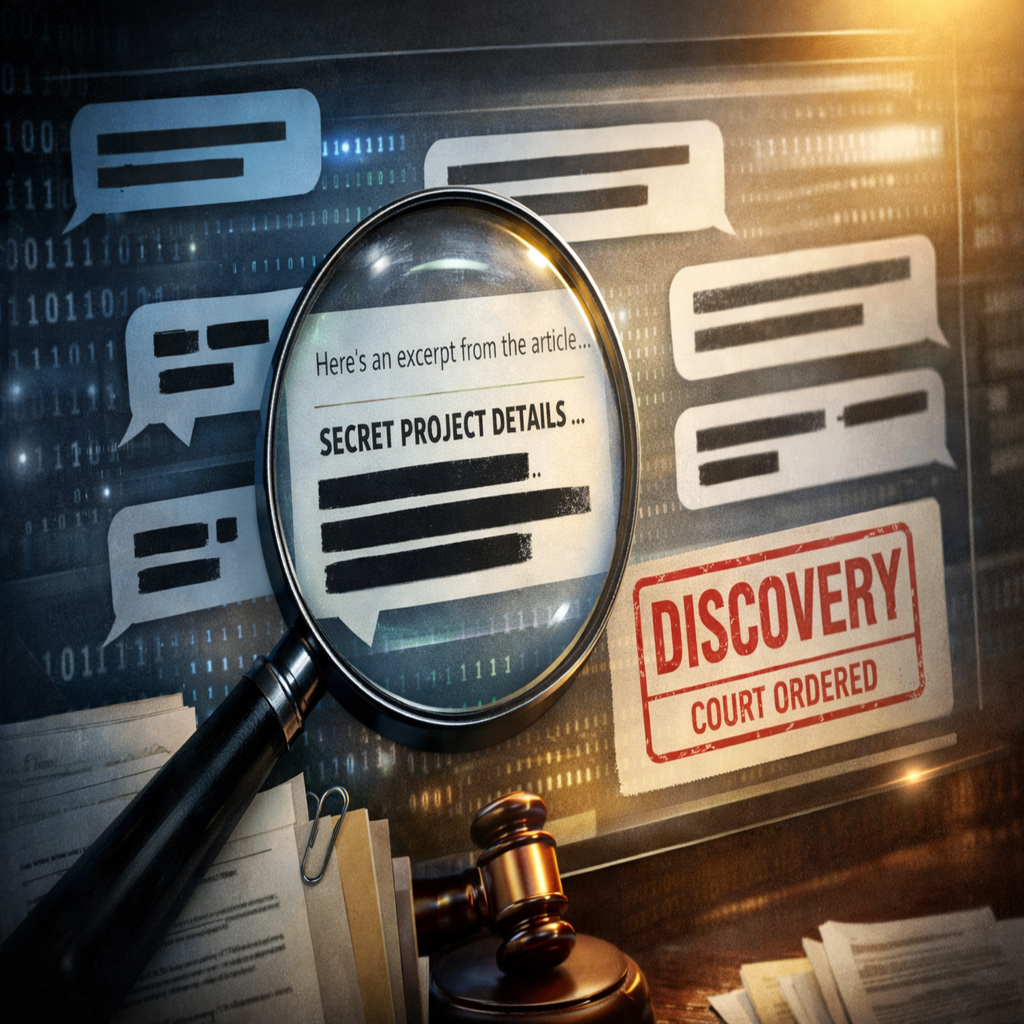Insights < BACK TO ALL INSIGHTS
Chatbots, Copyrights, and the Courts: The Latest in Litigation Developments in the Cases Against OpenAI
FEATURED
January 5, 2026
Chatbots, Copyrights, and the Courts: The Latest in Litigation Developments in the Cases Against OpenAI
By: Abbey Block
Litigation Update: Open AI’s Discovery Woes and Fair Use Defenses in Infringement Lawsuits Since its formation in 2015, the artificial intelligence company “Open AI” – most known for its creation of the widely used chatbot, “ChatGPT” – has faced its fair share of legal disputes. Two of the most notorious lawsuits, one filed by the New York Times and the other by a class of prominent fiction authors, are moving full steam ahead, illustrating the complex interplay of legal rights, litigation tools, and technological innovation. This blog post examines the most recent developments in the lawsuits, and considers what these developments mean for the parties, and the future of artificial intelligence more broadly. Judge Orders Open AI to Disclose Chat…
The Truth Will Out – Even About Mar-a-Lago
December 27, 2025
The Truth Will Out – Even About Mar-a-Lago
By: James Trusty
The Truth Will Out is a fairly obscure phrase that was popularized in Shakespeare’s “The Merchant of Venice.” It suggests that even against the most active obstruction and obfuscation, the Truth seemingly has an invisible hand behind it that relentlessly—if slowly—pushes it into plain view. Nearly 2 ½ years after the FBI’s raid on Mar-a-Lago, the Truth may be emerging into the daylight. August 8,…
White-Collar Sentencing Under the Amended Guidelines: Fewer Steps, Same Dance
November 12, 2025
White-Collar Sentencing Under the Amended Guidelines: Fewer Steps, Same Dance
By: Robert Ward
For years, the U.S. Sentencing Commission’s Guidelines Manual has guided courts through a three-step process to determine the sentence to be imposed. At a high level, that process looked like this: First, the court would calculate the guideline range based on relevant offense conduct and related factors, along with the defendant’s criminal history. Second, the court would consider the Sentencing Commission’s policy statements or commentary…
High Court Clarifies Rule on Plea Discussions in Federal Criminal Cases
July 10, 2013
High Court Clarifies Rule on Plea Discussions in Federal Criminal Cases
By: Ifrah Law
In a unanimous decision, the Supreme Court held last month in United States v. Davila that a guilty plea does not need to be automatically vacated, regardless of whether there has been prejudice to the defendant, when a magistrate judge improperly advises a defendant to plead guilty. In 2009, Anthony Davila was charged with conspiracy to defraud the United States by filing false income tax…
BP Employee Gains Dismissal on Obstruction of Justice Charge
July 9, 2013
BP Employee Gains Dismissal on Obstruction of Justice Charge
By: Ifrah Law
When is a committee not a committee? When it is a subcommittee. More than just a punchline, this is one of the key facts that led a U.S. district judge recently to dismiss charges against an employee of British Petroleum arising from his statements made in response to inquiries from a Congressional subcommittee regarding the BP Horizon oil spill in the Gulf of Mexico. In…
Andrew Auernheimer Appeals Hacking Conviction in This Internet Law Case
July 5, 2013
Andrew Auernheimer Appeals Hacking Conviction in This Internet Law Case
By: Ifrah Law
Earlier this week, attorneys for convicted computer hacker Andrew “Weev” Auernheimer filed their opening brief in their appeal to the U.S. Court of Appeals for the Third Circuit to have his conviction overturned. In 2010, Auernheimer’s co-defendant Daniel Spitler, who agreed to plead guilty in 2011, discovered a flaw in AT&T’s iPad user database, that he used to collect 114,000 email addresses. Auernheimer then disclosed…
Prosecutor Fired for Lying on Facebook to Witnesses in Murder Case
June 27, 2013
Prosecutor Fired for Lying on Facebook to Witnesses in Murder Case
By: Jeffrey Hamlin
For all its benefits, social media has posed some significant challenges for our criminal justice system. One of the more common problems – Internet-related juror misconduct – has been the subject of numerous criminal appeals lately. It has also burdened federal and state governments with added costs for misconduct hearings and retrials. It is no wonder, then, that the Cuyahoga County Prosecutor’s office in Ohio…
Kansas Juror Found in Contempt for Online Comments During Trial
June 10, 2013
Kansas Juror Found in Contempt for Online Comments During Trial
By: Jeffrey Hamlin
Two years ago, we anticipated a growing problem with jurors who disregard trial judges’ instructions concerning Internet use. In July 2011, we reported on the first known prosecution of a juror in Great Britain for Internet-related misconduct. Since then, a Florida judge sentenced a Sarasota County juror to three days in jail for criminal contempt. In that case, the juror contacted a civil defendant on…





